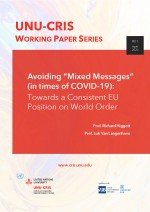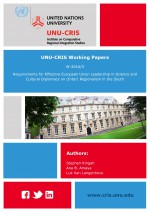The EU as a Global Actor and the Emergence of 'Third Generation' Regionalism
After a first generation of regionalism that focussed primarily upon trade and economic integration, a second generation – often referred to as ‘new regionalism’ –broadened integration to internal policies and regulations. Today, a ‘third generation’ of regionalism is emerging that emphasises the role of regions as global actors. This article examines the role of the EU as a ‘global actor’ on several dimensions (trade, development, security and the implementation of global regimes) that are usually attributed to ‘new regionalism’. Next, it will be explored how the EU can also be regarded as a prototype of the emerging ‘third generation’ regionalism that emphasises the role of regions as global actors within the global institutions such as the U.N. This ‘third generation’ regionalism can lead towards a new kind of interregional relations and a new ‘regional world order’ that is not post-Westphalian but rather neo-Westphalian. Viewed from a U.N. perspective, this opens possibilities to re-think multilateralism into what Hettne (2003) has called “multiregionalism”.



